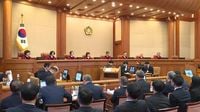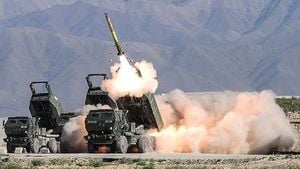As tensions rise in South Korea over the impeachment of President Yoon Suk-yeol, the Constitutional Court remains in deliberation without a verdict date. On March 26, 2025, members of the ruling People Power Party and the opposition Minjoo Party gathered outside the Constitutional Court in Jongno-gu, Seoul, to protest against the impeachment proceedings. The protests come as the court continues to weigh the implications of the impeachment trial against Yoon, which has been ongoing since the conclusion of arguments on February 26.
Despite the high stakes, the court has yet to announce when it will issue its verdict. The eight judges involved in the case held discussions on March 26 but did not reach a conclusion. The lack of clarity has led to speculation that the verdict may be postponed until April, particularly given that judges typically announce verdict dates 2-3 days in advance of the actual decision.
Political analysts have noted that the ongoing deliberations could be influenced by the recent ruling in the trial of Lee Jae-myung, the leader of the Minjoo Party, who was acquitted of election law violations on the same day. Concerns have been raised that if the court announces a date soon after Lee’s verdict, it could create perceptions of political bias in the impeachment process. However, a court official has stated that the two cases are unrelated.
As the court grapples with its decision, the atmosphere outside has grown increasingly charged. Protesters from both major political parties have gathered, each side vocalizing their support or opposition to the impeachment. The protests have become a focal point for public sentiment, reflecting deep divisions within South Korean society regarding Yoon’s presidency.
Former President Moon Jae-in has also weighed in, urging the court to expedite its decision. He stated, “A prompt impeachment decision is the only way to uphold constitutional values and the court’s significance.” He implored the judges to work through the night if necessary to ensure that the verdict does not extend into April.
As the court has not provided any updates, rumors have circulated about potential internal disagreements among the judges, which could be contributing to the delay. Legal experts suggest that the court may be wrestling with complex issues surrounding the charges against Yoon, including allegations of insurrection—an unprecedented consideration in South Korean politics.
On March 26, a judge was seen leaving the court building, signaling the end of the day’s proceedings, but there was no announcement regarding the impeachment case. Observers noted that the judges’ continued deliberations are unusual, as it has been over a month since the arguments concluded.
Adding to the uncertainty, the terms of judges Moon Hyung-bae and Lee Mi-sun are set to expire on April 18, 2025. This looming deadline has intensified speculation about whether the court will be able to reach a verdict before their departure. If the deliberations extend past this week, the possibility of a verdict being issued in April increases significantly.
Legal scholars have expressed concern that the court’s inability to finalize its decision could lead to a crisis of legitimacy, not just for the court itself, but for the presidential office as well. Some commentators have suggested that the court may be facing pressure from various political factions, complicating the decision-making process.
In the meantime, the public is left waiting for clarity. The court is scheduled to hold regular sentencing on March 27 for 40 cases unrelated to the impeachment, which will include ten constitutional complaints and thirty objection cases. This regular session could further distract from the impeachment proceedings.
As the situation unfolds, the uncertainty surrounding President Yoon’s fate continues to dominate headlines and public discourse in South Korea. The outcome of the impeachment trial will not only impact Yoon’s presidency but could also shape the political landscape for years to come.
With protests intensifying and political stakes at an all-time high, the Constitutional Court faces immense pressure to deliver a verdict that reflects the will of the people while upholding the rule of law. The next few days will be critical in determining the future of Yoon Suk-yeol’s presidency and the integrity of South Korea’s judicial system.

![[헌재는 지금]](https://thumbor.evrimagaci.org/rXuGaqKTRUbAHsDYZ1Z-gaW4LTM=/200x0/tpg%2Fsources%2F08f9bf8c-b579-4018-9682-f9064f480945.jpeg)

![[포토] 헌재 앞 소리 없는 아우성](https://thumbor.evrimagaci.org/Cr3JsszKZQahqm97LMDcSPVZWZE=/200x0/tpg%2Fsources%2F787e92b3-cf6a-45dc-a71b-5cf15fe7e590.jpeg)



